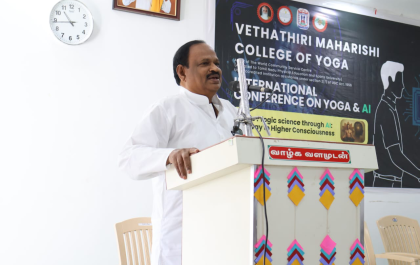Dr Ishwar V. Basavaraddi
Founding Member, IYA
Yoga is an ancient science and an art of healthy living that is intended for a healthy mind in a healthy body. Yoga gives us knowledge of the body, mind and the self. The methods used by Yogis are sensory observation, logical reasoning, insight and introspection; hence, it is a science. Yoga is also an art; it teaches us how to live well, by bringing harmony between man and nature. Yoga has been in the public domain for thousands of years and has been practiced by millions of people worldwide with benefits.

Yoga is increasingly recognised by Indian and Western culture as a holistic health intervention with various illnesses including pain, chronic diseases, metabolic conditions, cardiac and cancer rehabilitation and mental illness. As a result, there is a growing number of researches looking into the health and therapeutical benefits of Yoga. This suggests that Yoga protocols of similar composition and duration, improve exercise capacity and health related quality of life among patients with chronic diseases.
Researches show, Yoga practices particularly pranayama and meditation, can increase multiple neurotransmitters and hormones such as GABA, serotonin, and dopamine—all-natural anti-depressants. They have been shown to increase levels of melatonin, helping to initiate sleep, improving sleep quality and sleep regulation, and increasing levels of oxytocin- the bonding hormone. Dean Ornish found a significant association between comprehensive lifestyle changes (including yoga, meditation, breathing, stress management and a healthy whole-food, plant-based diet), and increased telomerase activity in human peripheral blood mononuclear cells. Of interest, the participants of this study also showed significant reductions in psychological distress and low-density lipoprotein cholesterol. Yoga practices can help to lower blood pressure, increase lung capacity, improve respiratory function and heart rate, improve circulation and boost muscle tone. Yoga reduces stress both by balancing the autonomic nervous system with increased parasympathetic and reduced sympathetic activities, respectively, thus optimizing and restoring the body’s homeostasis (decreasing allostatic load), as well as decreasing the reactivity of the HPA axis. By decreasing both of these pathways, yoga can interrupt multiple different inflammatory events on the cascade toward CVD and enhance cardiovagal function.
This is an era of AI, science and technology. There is a need to look and evaluate traditional, age-old Yoga practices and concepts of yoga through scientific lenses and methods without compromising the individual experiences. This brings medical and scientific community to accept and practice yoga. We have to show, Yoga practices and conscious breathing & relaxation techniques helps to regulate neurotransmitters, neuropeptides, hormones, and cytokines that mediate interactions between the central nervous system and the immune system. These techniques reduce the psychological and physiological effects of chronic stress.
Yoga is based on the principle that the mind and body are inter related. Yoga practice can improve the functions of a different system of the body, foster psychological well-being and, improve the oxygen delivery to tissue, remove the metabolic waste product, carcinogens, and cellular toxins; and scientific evidence has begun to emphasize its efficacy It is now considered a low-cost intervention to control various lifestyle disorders. The main aims of the implications of Yoga are to increase parasympathetic and decrease sympathetic activities.
It may be further hypothesized that Yoga-based practices correct under activity of the parasympathetic nervous system and gamma amino butyric acid systems, partly through the stimulation of the vagus nerves, the main peripheral pathway of the parasympathetic nervous system. Yoga enables us to move from a state of ill health to one of fitness and healthy living. Yoga is an excellent tool for global health and wellbeing.
Its numerous benefits, including stress reduction, improved mental clarity and focus, physical health, mindfulness and spirituality, make it a valuable practice for anyone seeking to improve their overall wellbeing. Yoga can also contribute to global wellbeing by promoting peace and harmony, environmental sustainability, cultural awareness and unity in diversity.
Regular Yoga practice can be done in many ways, such as at home or at work place or in a Yoga studio/centre setup. There are many different styles of Yoga in present times to choose from, so individuals can find a style that suits their needs and preferences. Let IYA, Yoga lineages and Institutions shall look in to these possibilities to promote Yoga as a traditional medicine.















